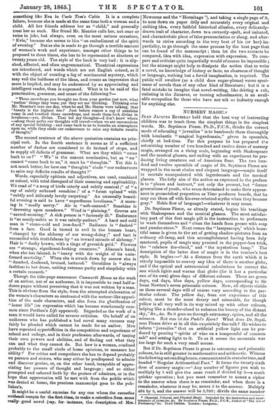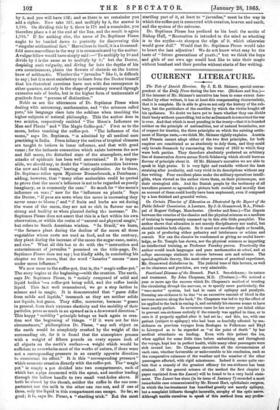NURSERY MAGIC.*
JEAN JAceuEs RoussEAu held that the best way of instructing children was to teach them the simplest things in the simplest words. Mr. Septimus Piesse, Ph.D., F.C.S., thinks the correct mode of educating " juveniles " is to bamboozle them thoroughly with bombastic " magical legerdemain," given in spoonfuls, chiefly at bed-time. For this purpose he has prepared the astonishing number of two hundred and twelve doses of nursery magic, arranged on a rising scale, beginning with Shakespeare and the musical glasses, and ending with an experiment for pro- ducing living creatures out of American flour. The two hun- dred and twelve spoonfuls of magic of Dr. Septimus Piesse are wrapped in the most choice and elegant language—magic itself to mortals unacquainted with legerdemain and the musical glasses. The lofty aim of the author as expressed in the preface is to " please and instruct," not only the present, but "future generations of youth, who seem determined to make their appear- ance in geometrical proportion as Time produces beards, that he may cut them off with his ever-whetted scythe when they become grey." Noble flow of language l—whatever it may mean.
Dr. Septimus Piesse, as already stated, begins his teachings with Shakespeare and the musical glasses. The most satisfac- tory part of this first magic pill is the instruction to performers to wash themselves and " clean the hands from grease with soap and pumice-stone." Next comes the " lampascope," which beau- tiful name is given to the art of getting shadow-pictures from an ordinary oil-lamp, and this accomplishment having been duly mastered, pupils of magic may proceed to the pepper-box trick, the " rainbow fire-cloud," and " the mysterious lamp." The description of the latter dose of magic is in the teacher's best style. It begins :—" At a distance from the earth which it is utterly impossible to convey any idea of there is another globe, and if the optical and astronomical calculations be correct the sun which lights and warms that globe (for it has a particular sun of its own) gives days of different colours. There are green days, red days, blue days, yellow days, corresponding to Sir Isaac Newton's seven prismatic colours. Now, all objects visible on these several days will of course vary according to the par- ticular colour. The yellow day, from our experience of this colour, must be the most dreary and miserable, for though yellow is all very well in its way mixed up with other colours, helping like a thunder-cloud to enhance the beauty of the distant sky," &c., &c. So it goes on through astronomy, optics, and all the sciences. But was ist des Putters Kern? What does Dr. Septi- mus Piesse drive at in all this exquisitely fine talk? 'He wishes to inform " juveniles " that an artificial yellow light can be pro- duced by pouring "spirits of 'wine on a teaspoonful of common salt" and setting light to it. To us it seems the mountain was too large for such a very small mouse.
But if Dr. Septimus Piesse is great in astronomy and prismatic colours, he is still greater in mathematics and arithmetic. Witness the following astoundinglesson, communicated in oracular tone, and headed " Singular Arithmetical Fact." It forms the twenty-sixth dose of nursery magic :—" Any number of figures you wish to multiply by 5 will give the same result if divided by 2—a much quicker operation ; but you must remember to annex a cipher to the answer when there is no remainder, and when there is a remainder, whatever it may be, annex 5 to the answer. Multiply 464 by 5, and the answer will be 2,320; divide the same number • Chyynical, Natural. mod Physical Magic. Intended for the instruction and enter- tainment of juveniles, Sc. By Septimue Please, Ph.D., F.C.B., Author of "The Art of Perfumery," Ac. Third Edition. London: Longman.
by 2, and you will have 232; and as there is no remainder you add a cipher. Now take 357, and multiply by 5, the answer is 1,785. On dividing this by 2, there is 178 and a remainder, you therefore place a 5 at the end of the line, and the result is again 1,785." If for nothing else, the name of Dr. Septimus Piesse ought to be handed down to posterity for discovering this "singular arithmetical fact." Marvellous iu itself, it is a thousand- fold more marvellous in the way it is communicated by the author. Avulgar fellow would have simply said :—" To multiply by 10 and divide by 2 is the same as to multiply by 5;" but the Doctor, despising such vulgarity, and diving far into the depths of his own consciousness, plants the flowers of rhetoric on the barren brow of arithmetic. Whether the " juveniles " like it, is difficult to say ; but it is most satisfactory to learn from the Doctor himself that his rhetorical exertions have met with due recompense in other quarters, not only in the shape of pecuniary reward through extensive sale of books, but in the higher form of testimonials of gratitude from "persons of distinction."
Noble as are the utterances of Dr. Septimus Piesse when dealing with astronomy, mathematics, and " the sciences called pure," his language rises into the sublime when touching the higher subjects of natural philosophy. This the author does in two articles, respectively entitled " The Moon's Influence on Man and Plants" and " The Magic Coffee-pot." First as to the moon, before touching the coffee-pot. "The influence of the moon," says Dr. Septimus, " is admitted by all medical men practising in India. From infancy the natives of tropical climates are taught to believe in lunar influence, and that with good cause ; for the intimate connection which exists between the new and full moon, the disturbed state of the atmosphere, and the attacks of epidemic has been well ascertained." It is impos- sible, we should say, to doubt the " intimate connection between the new and full moon," leaving alone epidemics. As to these, Dr. Septimus relies upon Mynheer Diemerbroeck, a Dutchman ; adding, however, that " many other authorities could be quoted to prove that the moon's influence is not to be regarded as purely imaginary, as is commonly the case." So much for "the moon's influence on man ;" now for the "influence on plants." Says the Doctor, "If peas are sown when the moon is increasing they never cease to bloom ;" and "if fruits and herbs are set during the wane of the moon, they are not so rich in flavour nor so strong and healthy as when planted during the increase." Dr. Septimus Piesse does not assert that this is a fact within his own observation, or within the realm of "natural and physical magic," but refers to South American wisdom. "In Brazil," we learn, "the farmers plant during the decline of the moon all those vegetables whose roots are used as food, and on the contrary, they plant during the increase of the moon the sugar-cane, maize, and rice." What all this has to do with the " instruction and entertainment of juveniles " promised on the title-page, Dr. Septimus Piesse does not say ; but kindly adds, in concluding his chapter on the moon, that the word " lunatics " means "men under moon influence."
We now come to the coffee-pot, that is, the " magic coffee-pot." The story begins at the beginning—with the creation. The earth, says Dr. Septimus Piesse, is " mainly composed of solid and liquid bodies "—a coffee-pot being solid, and the coffee inside liquid. This fact well remembered, we go a step farther in science and iu magic. It is demonstrated that " gases differ from solids and liquids," inasmuch as they are neither solids nor liquids, but gases. They differ, moreover, because " gases in general, from their extreme elasticity and the mobility of their particles, press as much in an upward as in a downward direction." This happy " mobility " principle brings us back again to crea- tion and the beginning of things. " If it were not for this circumstance," philosophizes Dr. Piesse, " any soft object on the earth would be completely crushed by the weight of the surrounding air, for it is found that the atmosphere presses with a weight of fifteen pounds on every square inch of all objects ou the earth's surface—a weight which would be sufficient to overwhelm most of the works of nature, if there were not a corresponding pressure in an exactly opposite direction to counteract its effect." It is this " corresponding pressure" which connects creation directly with the coffee-pot. The " magic pot" is simply a pot divided into two compartments, each of which has a pipe connected with the spout, and another leading through the hollow handle to two small vent-holes above. If both be closed by the thumb, neither the coffee in the one com- partment nor the milk in the other can run out, and if one of them, only the liquid in this compartment can escape. So far, so good ; it is, says Dr. Piesse, a " startling trick." But the most
startling part of it, at least to " juveniles," must be the way in which the coffee-pot is connected with creation, heaven and earth, and the system of the universe.
Dr. Septimus Piesse has prefixed to his book the motto of Bishop Hall, " Recreation is intended to the mind as whetting is to the scythe—to sharpen the edge of it, which otherwise would grow dull." Would that Dr. Septimus Piesse would take to heart the last adjective I We do not know what may be the taste of "future generations of youth ;" but we think the boys and girls of our own age would best like to take their magic without bombast and their puzzles without starts of fine writing.

































 Previous page
Previous page